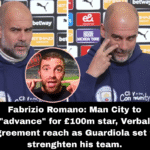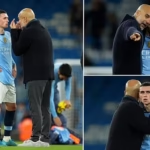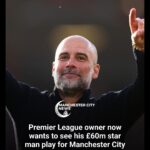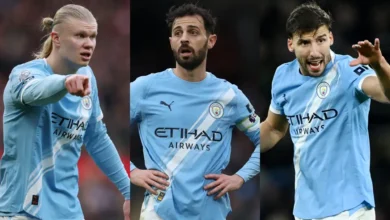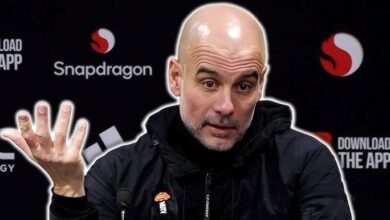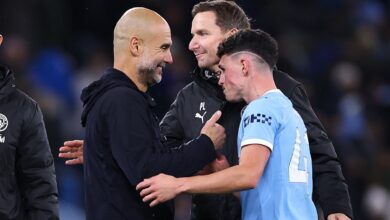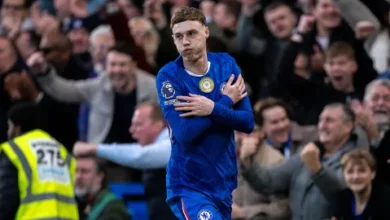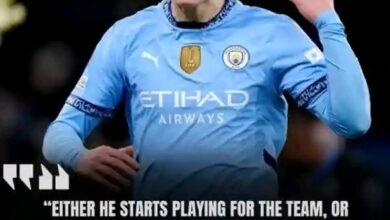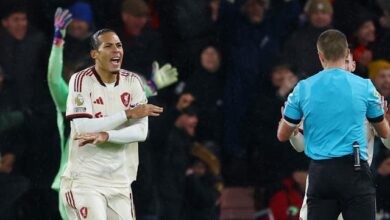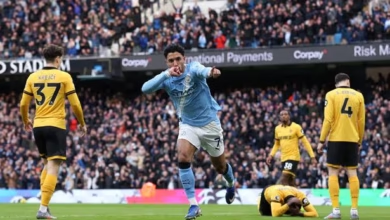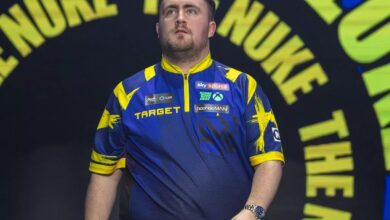Former Manchester United midfielder Paul Scholes believes Manchester City would be weakening their squad if they sign Morgan Gibbs

The summer transfer window has brought with it a wave of speculation surrounding Manchester City’s midfield plans, with particular focus on their pursuit of Nottingham Forest’s Morgan Gibbs-White as a potential replacement for departing legend Kevin De Bruyne. However, not everyone is convinced that this represents shrewd business for the Premier League champions.
Paul Scholes, the former Manchester United midfielder whose opinion carries significant weight in football circles despite his allegiances to City’s cross-town rivals, has voiced serious concerns about the proposed transfer. The Class of 92 graduate believes that bringing Gibbs-White to the Etihad Stadium would represent a significant downgrade from what De Bruyne has provided over his illustrious career at the club.
Speaking candidly about the potential transfer, Scholes didn’t mince his words when assessing the comparison between the two players. His assessment was stark and uncompromising: Gibbs-White simply isn’t at the same level as the Belgian maestro. This observation comes at a time when City are facing one of their most significant transitions in recent years, with several key players potentially departing and the club needing to make crucial decisions about their future direction.
The timing of Scholes’ comments is particularly interesting, as they come during a period when De Bruyne has shown glimpses of his former brilliance after what many considered a disappointing start to the campaign. The United legend acknowledged that while he initially felt it might be the right time for De Bruyne to move on, recent performances have caused him to reconsider that position. This flip in perspective highlights the complex nature of evaluating when a world-class player should be moved on, particularly one who has been so instrumental to City’s success over the past decade.
The Financial Reality of Modern Transfers
The financial aspect of any potential Gibbs-White transfer cannot be ignored, with Nottingham Forest reportedly demanding a fee somewhere between £70 million and £100 million for their prized asset. This valuation places the England international in the upper echelons of transfer fees, a price tag that reflects both his potential and Forest’s determination to retain their key players following their successful return to the Premier League.
The variation in reported fees suggests there may be room for negotiation, but even at the lower end of the spectrum, £70 million represents a significant investment for a player who, while talented, has yet to prove himself at the very highest level of European football. This is where Scholes’ concerns gain additional weight – is Gibbs-White worth such a substantial outlay when compared to what De Bruyne has delivered for City over the years?
David Ornstein, widely regarded as one of the most reliable journalists in football transfer reporting, has confirmed City’s genuine interest in the player. This lends credibility to the speculation and suggests that Pep Guardiola and his recruitment team see something in Gibbs-White that they believe could translate to success at the Etihad. However, interest and actual pursuit are two different things, and City’s history shows they are not afraid to walk away from deals they don’t consider value for money.
The club’s approach to transfers under Guardiola has generally been methodical and strategic, with a focus on players who can immediately contribute to their style of play while also offering long-term value. Gibbs-White, at 25 years old, would theoretically fit this profile, offering several years of peak performance while still having room for development under one of the world’s best coaches.
Alternative Targets and Strategic Flexibility
Rather than committing fully to the Gibbs-White pursuit, Manchester City appear to be exploring alternative options, demonstrating the kind of strategic flexibility that has served them well in previous transfer windows. Lyon’s Rayan Cherki has emerged as a potential alternative target, representing a significantly different profile both in terms of playing style and financial commitment.
The French midfielder, who has been making waves in Ligue 1 with his technical ability and creativity, would come at a fraction of the cost being quoted for Gibbs-White. Reports suggest that Cherki could be available for as little as €25 million (approximately £21 million) due to a potential release clause in his contract, though there remains some debate about the exact terms of such a clause.
This price differential is staggering when considered alongside the respective talents of both players. While Gibbs-White has the advantage of Premier League experience and proven adaptation to English football, Cherki’s significantly lower cost would allow City to allocate resources to other areas of the squad that may need strengthening. This approach aligns with City’s historical transfer strategy under their current ownership, where they have often found value in the market rather than simply pursuing the most expensive options.
Hugo Viana, who is set to take over as Director of Football from Txiki Begiristain, appears to be already influencing transfer decisions despite not officially starting his role. This suggests a continuity of approach that should reassure City fans concerned about potential disruption during the transition period. Viana’s reputation for identifying and developing talent during his time at Sporting CP indicates that he may favor the more economical option represented by Cherki.
De Bruyne’s Destination and Legacy
While much of the focus has been on who might replace Kevin De Bruyne, the question of where the Belgian international will continue his career remains fascinating in its own right. Initial speculation had linked him with a move to Major League Soccer, specifically with Chicago Fire reportedly offering a lucrative package to tempt him across the Atlantic.
However, recent developments suggest that De Bruyne may not be ready to step away from Europe’s elite competitions just yet. Serie A champions Napoli have apparently been successful in their efforts to persuade the midfielder to remain in European football, with a move to Naples looking increasingly likely for the start of July.
This development would represent a significant coup for Napoli, who are looking to build on their recent Serie A triumph and establish themselves as consistent challengers in both domestic and European competitions. De Bruyne’s arrival would undoubtedly raise their profile and capabilities, while also allowing the player to continue competing at the highest level in a league that has experienced something of a renaissance in recent years.
The choice to remain in Europe rather than pursue the financial rewards available in MLS suggests that De Bruyne still feels he has something to prove at the elite level. This decision may also vindicate Scholes’ recent comments about the player showing signs of his former brilliance, indicating that reports of his decline may have been greatly exaggerated.
For Manchester City, losing De Bruyne to a European rival rather than seeing him move to a less competitive league represents both a challenge and a compliment. It’s a challenge because they may face him in European competition, but it’s also a compliment to the player they helped develop into one of the world’s finest midfielders.
The Broader Transfer Context
City’s midfield rebuild extends beyond just replacing De Bruyne, with reports suggesting they are also targeting AC Milan’s Tijjani Reijnders as another potential addition. The Dutch midfielder has impressed in Serie A and represents the kind of versatile, technically gifted player that typically thrives under Guardiola’s management.
Reijnders’ potential arrival would add further competition for places in City’s midfield while providing different tactical options for Guardiola to explore. The 26-year-old’s ability to play in multiple positions across the midfield would give City the flexibility they often require during a long season competing across multiple competitions.
The combination of potentially signing both Cherki and Reijnders, rather than just Gibbs-White alone, would represent a more comprehensive approach to squad rebuilding. This strategy would provide Guardiola with multiple options and tactical variations, something that has been crucial to City’s success in recent years.
Former Netherlands international Ruud Gullit has spoken positively about Reijnders’ potential impact at City, describing him as a winner who would fit perfectly into their culture and playing style. Such endorsements from respected former players carry weight and suggest that City’s recruitment team have identified players who possess not just the technical ability but also the mentality required to succeed at the Etihad.
Analyzing the Scholes Critique
Returning to Paul Scholes’ criticism of the potential Gibbs-White signing, it’s important to consider the context of his comments and the perspective they represent. As a former United player, Scholes obviously has no particular loyalty to City’s success, which may actually lend more credibility to his assessment rather than less.
His observation that Gibbs-White “isn’t the same” as De Bruyne reflects a broader truth about the difficulty of replacing truly world-class players. De Bruyne’s unique combination of vision, passing range, goal threat, and big-game temperament has made him virtually irreplaceable in the traditional sense. Any player brought in to fill his role will inevitably face unfavorable comparisons, regardless of their own considerable talents.
However, Scholes’ critique may also reflect a somewhat outdated view of how modern football squads are constructed. The days of direct like-for-like replacements are largely gone, with most top teams now focusing on building squads with multiple tactical options rather than trying to find exact replicas of departing players.
Gibbs-White’s strengths may be different from De Bruyne’s, but that doesn’t necessarily make him an inferior choice for City’s future needs. His pace, directness, and ability to carry the ball could provide Guardiola with different tactical options while still maintaining the creativity and goal threat that De Bruyne provided.
The Premier League Adaptation Factor
One aspect that shouldn’t be underestimated in this transfer discussion is the value of Premier League experience. Gibbs-White has not only adapted to English football but has thrived in it, demonstrating his ability to perform consistently at the highest level of domestic competition.
This adaptation factor has historically been crucial for City’s transfer success. Players who arrive with Premier League experience often settle more quickly and require less time to understand the physical and tactical demands of English football. This could be particularly important during a transition period when City are already dealing with the departure of several experienced players.
Cherki, while undoubtedly talented, would represent more of a gamble in this regard. The transition from Ligue 1 to the Premier League has proven challenging for many players, despite their obvious technical abilities. The pace, physicality, and tactical sophistication of English football can take time to master, and City may not have the luxury of a lengthy adaptation period if they are to maintain their competitive edge.
Long-term Strategic Considerations
Beyond the immediate question of who should replace De Bruyne, City’s transfer decisions this summer will likely be influenced by longer-term strategic considerations. The club is facing a period of transition with several key players in the latter stages of their careers, and any new signings need to be viewed through the lens of building for the future rather than just addressing immediate needs.
Gibbs-White, at 25, would represent a player entering his prime years, potentially offering City six or seven years of peak performance. This longevity factor may justify the higher transfer fee when viewed as a long-term investment rather than a short-term solution.
Conversely, Cherki’s younger age profile and lower cost could make him an even more attractive long-term option, despite the adaptation risks. The French midfielder would have time to develop under Guardiola’s guidance while also retaining significant resale value should City’s plans change in the future.
The Guardiola Factor
Perhaps the most important consideration in any City transfer discussion is how potential signings would fit into Pep Guardiola’s tactical system and philosophy. The Spanish coach has a proven track record of improving players and adapting his tactics to maximize their strengths, which suggests that both Gibbs-White and Cherki could potentially thrive at the Etihad.
Guardiola’s ability to develop players tactically and technically has been one of the defining features of his time at City. Players like Phil Foden, Bernardo Silva, and even De Bruyne himself have reached new levels under his guidance, suggesting that the right player could exceed expectations regardless of their current level.
This coaching factor may be why City feel confident in pursuing players who aren’t yet at De Bruyne’s level. The belief that Guardiola can unlock additional potential in the right players has been validated repeatedly during his time at the club, making the comparison with De Bruyne’s current ability less relevant than it might appear.
Conclusion: Balancing Ambition and Pragmatism
The debate surrounding Manchester City’s midfield recruitment this summer encapsulates many of the challenges facing elite football clubs in the modern era. The need to balance immediate competitive requirements with long-term strategic planning, while also managing financial constraints and squad harmony, requires careful consideration of multiple factors.
Paul Scholes’ criticism of the potential Gibbs-White signing reflects legitimate concerns about the difficulty of replacing a player of De Bruyne’s caliber. However, it may also underestimate the potential for tactical evolution and the value of building for the future rather than simply trying to replicate the past.
Whether City ultimately pursue Gibbs-White, Cherki, or alternative targets entirely, their decision will likely be based on a complex calculation involving cost, potential, tactical fit, and long-term strategic value. The club’s track record in the transfer market suggests they will make decisions based on thorough analysis rather than external pressure or expectations.
The summer transfer window will ultimately reveal whether City’s recruitment team believes they can find adequate replacements for De Bruyne’s unique talents, or whether they will need to fundamentally adjust their tactical approach for the post-De Bruyne era. Either way, the decisions made in the coming weeks will have significant implications for the club’s competitive prospects in the seasons ahead.
As the transfer saga continues to unfold, one thing remains certain: replacing a player of Kevin De Bruyne’s stature and influence will require more than just identifying a single successor. It will demand a comprehensive approach to squad building that considers not just individual talent, but how new signings can contribute to the collective success that has defined Manchester City’s recent golden era.
